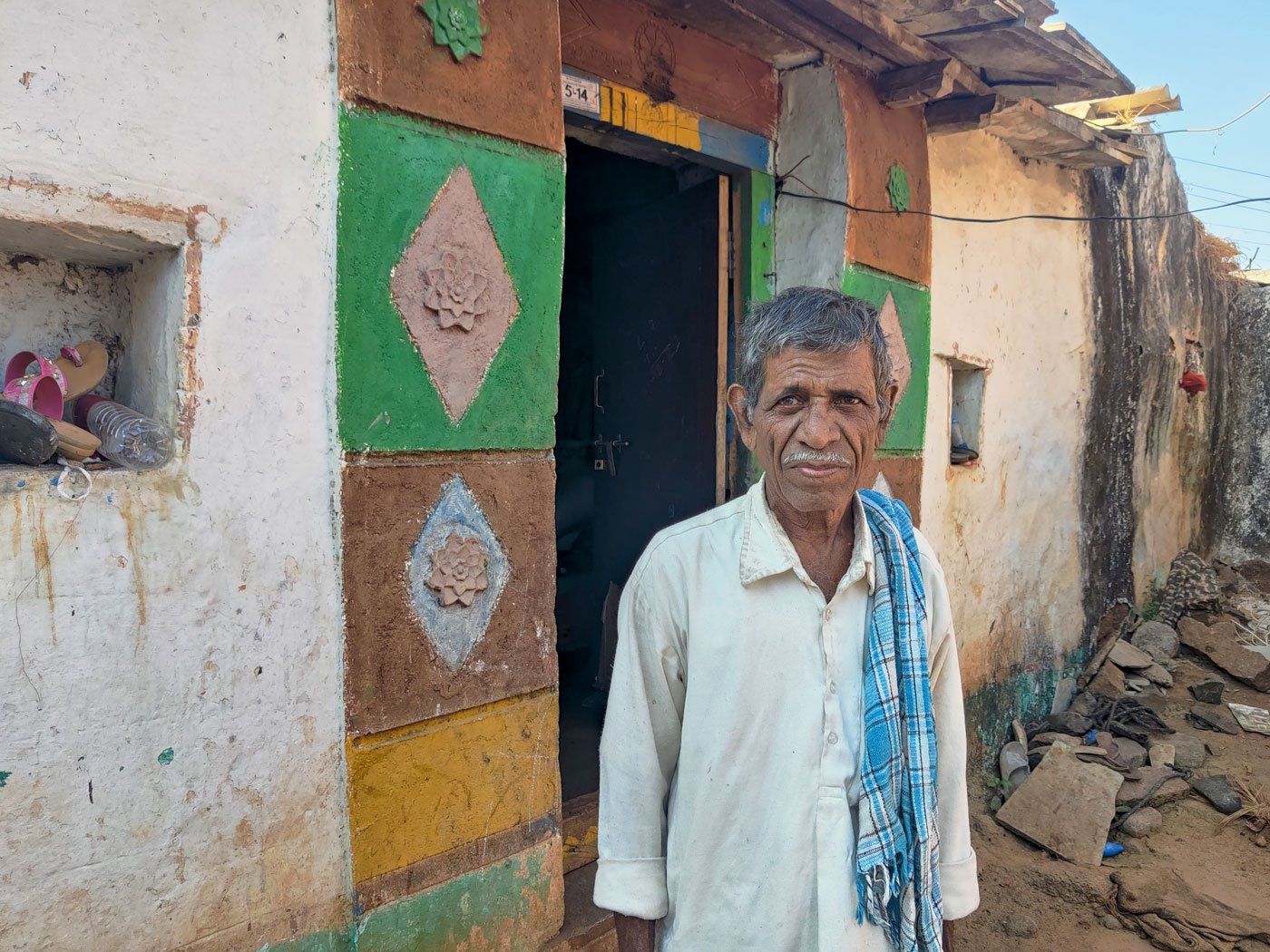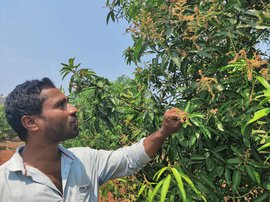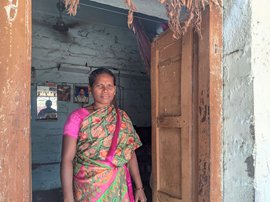Gaddamidi Rajeshwari became a landowner in 2018. “I was excited! I would be a woman who owns land.”
Or at least she thought so, looking proudly at the official title deed in her hand.
Five years later she is still waiting for the state to recognise her ownership of 1.28 acres of land in Barwad, 30 kilometres from her home in Yenkepalle village for which she paid Rs. 30,000.
Within months of buying the land, Rajeshwari had a title deed, Encumbrance statement and all documents she needed to get a
pattadar
passbook. But that would prove elusive. “It’s been five years now and I still haven’t received my
pattadar
[land owner] passbook. Without the
pattadar
passbook, is it [the land] really mine?”
While a title deed shows how the ownership of land has been transferred, the
pattadar
passbook gives more details about the ownership. The passbook has the
pattadar
’s name, survey number, type of land, and more. It also has the owner's passport photo and the
tehsildar's
(revenue collector’s) signature.
![Gaddamidi Rajeshwari holding the title deed for the land she bought in 2018. ' It’s been five years now and I still haven’t received my pattadar [land owner] passbook'](/media/images/02-IMG_101145-AK-Is_this_land_really_mine.max-1400x1120.jpg)
Gaddamidi Rajeshwari holding the title deed for the land she bought in 2018. ' It’s been five years now and I still haven’t received my pattadar [land owner] passbook'
Rajeshwari’s hopes went up when the Dharani portal – an online land records management system – was launched in October 2020 under the Telangana Rights in Land and Pattadar Pass Books Act, 2020 .
At the time of its launch, the Telangana Chief Minister, K. Chandrasekar Rao called it a farmer-friendly initiative and said, “the platform also simplifies and expedites the land registration procedure. People are not required to visit several offices.”
Rajeshwari’s husband, Ramulu says, “we hoped that the Dharani [portal] would solve our problem and that we would finally get our passbook,” he says. “Until the end of 2019, we kept going to the
tehsildar
’s office at least twice a month.”
In 2020, when the couple checked on the Dharani portal, they found that the survey number of their land was missing from the portal altogether. And, it couldn’t be added manually.
“One of the major issues with the Dharani portal is that the choices for editing/changing any errors [such as name, acres, or missing survey number] are currently quite limited,” admits Bhargavi Vuppala, KisanMitra's District Coordinator and Counsellor in Vikarabad.


Left: Ramulu and Rajeshwari spent Rs. 30,000 to buy 1.28 acres of land in Barwad, 30 kilometres from their home in Yenkepalle village. Right: Mudavath Badya in his home in Girgetpalle village in Vikarabad district
An error in the name of the owner is holding back Mudavath Badya from legally owning his land, about 20 kilometres away in Girgetpalle, Vikarabad district. The portal has recorded his name as ‘Badya Lambada’, the latter is his community’s name, listed as Scheduled Tribe in Telangana. His name should have said ‘Mudavath Badya’.
Badya owns two acres of land that he bought 40 years ago. “I farmed on other’s farms, worked at construction sites, and brick kilns for so many years before being able to own land,” the 80-year-old says. He grew corn and
jowar
but he says, “the money from farming was never enough. Most of the crops used to get destroyed due to the heavy rains.”
Since his name has been registered incorrectly, he has not been able to avail the
Rythu Bandhu
scheme – a welfare scheme in Telangana where a farmer who owns at least an acre of land is paid Rs. 5,000 for each acre, twice a year, for the
rabi
and
kharif
seasons.
According to an official at the Vikarabad District Collectorate who did not want to be quoted, Dharani’s problems have become a political tool, even as they are attempting to correct them. At the moment there are 10 details that can be amended under the ‘
specific land matters
’ category such as name, Aadhaar, photo, gender or caste.
About 40 kms away in Bopanwaram village, Rangayya has not been receiving money from Rythu Bandhu even though his name is spelt perfectly on the Dharani portal. Rangayya has five acres of land in Bopanwaram village. The land was assigned to him in 1989. Rangayya belongs to the Beda Jangam community which is listed as a Scheduled Caste in the state.


Left: Rangayya suddenly stopped receiving money from the Rythu Bandhu scheme even though his name is spelt perfectly on the Dharani portal Right: Badya bought two acres in Girgetpalle but his name was spelt incorrectly, he has not received the Rythu Bandhu money. Badya with his youngest son Govardhan (black shirt) in their one-room house
“I received the three instalments between 2019-2020. Once my land was digitised in the Dharani portal, I stopped receiving the money,” the 67-year-old Rangayya explains. He used to receive Rs. 25,000 (Rs. 5,000 for each acre) in each instalment.
“No officer is giving me a clear answer. This is probably because they themselves don’t know what to say or why this is happening,” he adds.
Bhargavi says that there is little to no option to correct errors manually on the portal. A counsellor at the collectorate, she adds, “in the case of assigned land, the portal only has options to modify the successor's name.” An assigned land cannot be sold, but only inherited.
Badya lives with his youngest son, Govardhan in a one-room
kachha
house in Girgetpalle; his wife passed away six years ago.
Not only is he not getting the Rythu Bandhu funds, but even his earnings of Rs. 260 a day from Mahatma Gandhi National Rural Employment Guarantee Act (MNREGA) work has stopped since his village, Girgetpalle was merged with the Vikarabad municipality.
He registered a grievance request at the Vikarabad Revenue Department in 2021 to change his name, but nothing has been done.
“My [youngest] son kept telling me to sell the land. He said he’ll use the money to buy a car and become a taxi driver. But I never did it. Maybe I should have,” Badya says.
*****


'Cotton is the only crop we can plant due to the lack of money and water in the region,' says Ramulu. Rajeshwari making jonne roti in their home in Yenkepalle village
Finally, in November 2022, Rajeshwari and Ramulu filed an application at the Collector's office in Vikarabad regarding the missing survey numbers.
Since then, they have visited the Kotepally
tehsildar
office and Vikarabad Collector’s office once a week. The Vikarabad Collector’s office is nearly 30 kilometres away from their home. They take a bus and a round trip costs each person Rs 45. They usually start in the morning and they only come back in the evening. “My two children leave for school and we leave in the hope of getting our passbook issued,” says Rajeshwari.
They have been farming on their 1.28 acres of land in Barwad since the end of 2018. “We plant [cotton] in June and the flowers bloom in mid-January. This is the only crop we can plant due to the lack of money and water in the region,” Ramulu says. They harvest a quintal annually and sell it for Rs. 7,750.
Not having a passbook has caused them to miss out on getting benefits under Rythu Bandhu. The couple say they have lost out on nearly eight instalments worth around Rs. 40,000.
They are unlikely to get arrears, says Bhargavi.


Left: Rangayya finds it odd that he doesn't get money under Rythu Bandhu but recieves money under a central government's scheme. Right: Rajeshwari and Ramulu have started herding goats after taking a loan from a moneylender
Rangayya of Bopanwaram village has lost out on Rythu Bandhu benefits, and says with less funds he can only afford to sow jowar and turmeric, from June to December.
The silver lining for Rangayya is that the central government’s portal does recognise him – he has been receiving payments from Pradhan Mantri Kisan Samman Nidhi (
PM-KISAN)
. Under this, small and marginalised farmers get Rs. 6,000 a year, ceded into their Aadhaar-linked bank accounts.
“If the central government has identified me as a beneficiary, then why has the state government removed me from the list of beneficiaries,” Rangayya questioned. “This happened only after the launch of Dharani.”
*****
In January 2023, finally fed up with waiting to be legally recognised as land owners, Rajeshwari and Ramulu took up animal husbandry – they belong to the Golla community who are traditional cattle herders. Ramulu took a loan of Rs. 1,00,000 from a private loan lender at an interest rate of 3 per cent a month to buy 12 goats. He has to pay Rs. 3,000 monthly for a year but this is only the interest.
“After a few months, we will begin selling the goats. Each baby goat will be sold for 2,000-3,000 [rupees] and the adult goats go for 5,000-6,000 depending on their health,” Ramulu explains.
They are determined to continue trying for the passbook for another year, but Rajeshwari does say tiredly, “maybe I am not meant to own land.”
This story is supported by a grant from
Rang De
.




